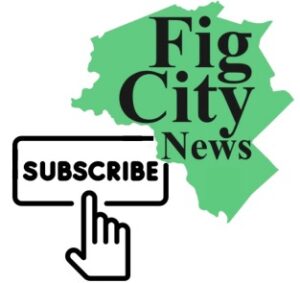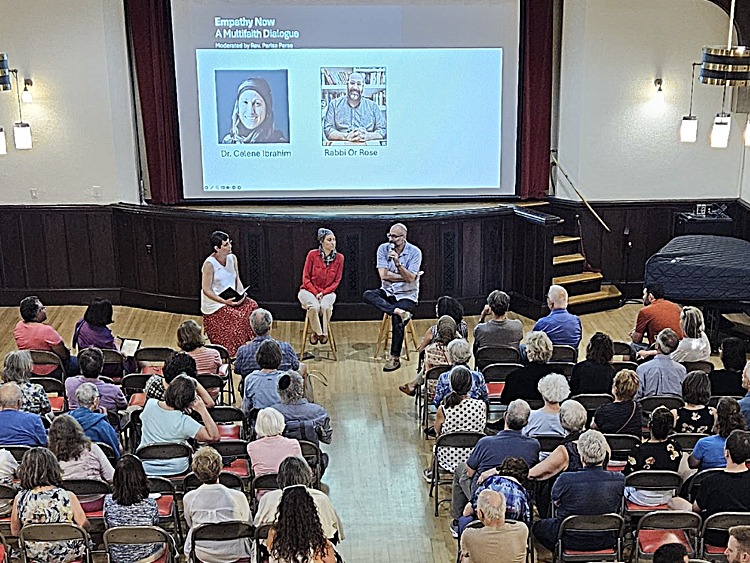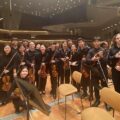On July 8, Rev. Parisa Parsa of the First Unitarian Society in Newton moderated Empathy Now: A Multifaith Conversation between Dr. Celene Ibrahim and Rabbi Or Rose. Dr. Ibrahim is a faculty member at the Groton School who teaches global history, religious studies, and applied ethics. Rabbi Rose is the founding director of the Betty Ann Greenbaum Miller Center for Interreligious Learning & Leadership of Hebrew College, and a senior consultant to Interfaith America. Together, they have created a longtime friendship built on productive discourse.
One of the organizers of the event — the City’s Director of Community Engagement and Inclusion, Hattie Kerwin Derrick — said that the goal of the conversation was to demonstrate to Newtonites how to have a respectful dialogue about contentious issues in an increasingly polarized world.
“We wanted it to be a peaceful event [with] people coming together,” Kerwin Derrick said. “We also wanted it in a place of worship, and we thought FUUSN would be a great place because…it’s all faiths coming together. Also, Rev. Parsa is an expert in facilitating such difficult conversations.”
During the event, both speakers sat on stools facing the audience, taking great care to articulate their personal beliefs while unpacking particular buzzwords that surround the Israel-Palestine conflict. For a conversation on something as convoluted and heart-wrenching as this ongoing conflict, Rabbi Rose and Dr. Ibrahim were able to model a discussion based on respect and the desire to understand one another.

The speakers came from different backgrounds, and this enriched their conversation. Rabbi Rose reflected on his identity as a progressive Zionist, underscoring the deep connection he and many other Jewish people feel for Israel — a country of religious significance that protects Jewish people from centuries of discrimination. He underscored the urgent need to pursue a peaceful and just solution for both Israelis and Palestinians. Dr. Ibrahim, who is also deeply tied to her religious faith, acknowledged the horrors that occurred on October 7th while also pointing out the humanitarian crisis occurring in the Gaza Strip. Both acknowledged that religious ideologies can exacerbate political violence and polarization – yet it is their faith that motivates them to support peacebuilding, justice, and reconciliation efforts. Still, Dr. Ibrahim and Rabbi Rose were able to find common ground with inspiring ease and were able to explain the challenges of fostering dialogue in the face of something so polarized.
The goals of the conversation were simple. As Rabbi Rose explained, “We want to try and help people consider their own intellectual, spiritual, and emotional states and how to bring their best selves to contentious conversations…They aren’t necessarily going to agree, but…in our city, we need to foster civic engagement.”
“It’s a passion of mine to engage in these dialogue events,” Rev. Parsa said. “It was really a delight to hear wisdom from Rabbi Rose and Dr. Ibrahim, because they are so deeply thoughtful and also so deeply religious. I consider it a privilege to be in a space occupied by folks like that.”

In the second half of the discussion, Rev. Parsa provided suggestions based on her career in consulting about handling difficult conversations. She emphasized the importance of empathy when engaging with others, providing a neuropsychological explanation of the science behind verbal arguments.
“Because we are living broadly in a time and place where there is such extreme polarization, I think we need to be a force that is countercultural,” Rabbi Rose said. “Encouraging people again to be both passionate in their positions but also compassionate in the interaction with others.”
Saadia Baloch, a co-organizer of the event, is a Newton resident affiliated with the Islamic Center of Boston (Wayland). “I think this is one of the few opportunities people in Newton have, people who are coming from different backgrounds: Jews, Christians, Muslims, Unitarians, to sit together and listen to things that promote dialogue and understanding and really be on the same footing to really engage in dialogue,” she said.
Wendy Schwartz, one of the attendees, echoed this sentiment, saying, “The key in coming to finding solutions is in coming to things like this with an open mind, and being able to engage. Because then you’re open to possibility and engaging with other people.”
This event was the first of a three-part series offered by the Newton Interfaith Clergy Association, the Miller Center for Interreligious Learning & Leadership of Hebrew College, the Islamic Center of Boston (Wayland), and the City of Newton. These four organizations were concerned about, according to Kerwin-Derrick, “how can we come back together,” and as Rabbi Rose noted, they sought to create a “reflective, interpersonal” call to action and foster civic engagement in a time and place of “such extreme polarization.”
Dates, locations, and finalized topics have not yet been set for the remaining two events in the series, but the group’s current planning is for:
- Israeli-Palestinian Peace & Justice Efforts — a discussion between Israeli and Palestinian peace and justice activists before and throughout the current war,
- The Challenges & Possibilities of Jewish-Muslim Life on the American Campuses — a discussion among chaplains from local institutions of higher learning.
Noa Kelmer-Racin is a Fig City News intern and a rising sophomore at Princeton University.





